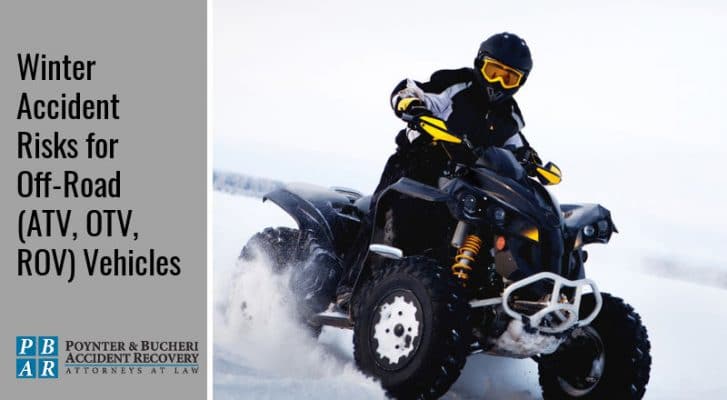
Winter Accident Risks for Off-Road (ATV, OTV, ROV) Vehicles

What you’ll learn reading this article:
- Off-road vehicles are risky to ride.
- Many vehicles can’t handle winter weather and some have been recalled.
- Know Indiana’s off-roading laws, especially if you’ve been injured.
Indiana’s off-road vehicles go by many names and abbreviations. We have all-terrain vehicles (ATVs), recreational off-highway vehicles (ROVs), utility task vehicles (UTVs), and many types of dune buggies, off-road golf carts, and dirt bikes.
What they all have in common is that they’re for off-road riding and shouldn’t be used on Indiana’s streets and highways. Plus, they’re a lot of fun in the wintertime.
But did you know off-road accidents are on the rise in Indiana? Here’s how you can minimize winter accidents and injuries on ATVs.
Why Off-Road Accidents are Becoming More Common
An Indiana trauma hospital director says she’s seen a rise in the “full spectrum” of off-road crashes, including ATVs, dirt bikes, golf carts, and many others. It’s particularly concerning, she says, because so many riders are children and so few wear helmets.
Meanwhile, ATV ownership is projected to rise steadily through 2025 and beyond. A North American financial forecast attributes this to several factors: the popularity of outdoor sports, an increase in the number of ATV-friendly recreational trails, and the diversity of these vehicles’ uses. In addition to recreation, they can be used for farming, lawn care, hunting, and patrolling your property.
During the winter when it’s difficult to access remote areas, you can hop on an ATV and bound through mud and snow. For an Indiana family with a large, wooded property, an off-road vehicle allows them to travel to the farthest corner in minutes.
An off-road vehicle is usually cheaper and easier to use than a snowmobile – plus, you can ride it year-round. So you can see why Indiana has so many shiny new ATVs.
Winter is Especially Treacherous for Off-Roading
Here’s the bad news. Off-road vehicles aren’t necessarily designed with rider safety in mind. Most allow the rider to sit high atop the main body of the vehicle, perched in a vulnerable position while gripping the vehicle with their arms and legs.
Winter weather can quickly create a dangerous situation for an off-roader. Within minutes, a previously flat, clear trail can become an icy, snowy mess. Suddenly the trail home is impassible and in extremely wet and muddy conditions, the vehicle may stall and leave the rider out in the middle of nowhere.
Some riders also overestimate an off-road vehicle’s ability to cope with a steep, rugged landscape. A small ATV probably can’t handle a large hazard in the vehicle’s path. When winter weather hits hard, the vehicle is at risk of losing its grip and flipping.
Another Off-Road Danger: Product Safety Recalls
As if the other dangers weren’t enough, some off-road vehicles have manufacturing defects. Polaris recalled many vehicles from 2018 to 2020 due to the risk of crashes and bodily injury from throttle breaks. But Polaris is certainly not the only offender.
Many other companies’ ATVs have been recalled for issues from steering control flaws to wheels separating from the vehicle while riding. The recalls include popular brands like Yamaha, Honda, Kawasaki, KTM, and KYMCO.
Off-road accidents also happen because the vehicles are poorly-maintained or have shoddy repairs made by people who aren’t experts in ATV care. This means there are many well-meaning Hoosier families with dangerous off-road vehicles that will only become more dangerous over time.
How to Avoid Off-Road Injuries and Accidents
You can minimize your chances of being hurt in an off-road accident by taking some proactive steps to stay safe. First, you can check for recalled vehicles at recalls.gov, which combines information from six federal agencies in the name of consumer safety.
It’s also important to know Indiana’s off-roading laws before you ever buy one of these vehicles. For example, each Indiana county has its own laws about riding on public property. There are also various local rules about which types of vehicles are allowed and the hours you can ride them.
Indiana law states that ATV riders must be 14 years old to ride unsupervised. Anyone under age 18 who is using an ORV, ATV, UTV, side-by-side vehicle, or dirt bike is required to wear a helmet – a law that applies to both public and private property and carries a penalty of $500.
Hurt in an Off-Road Accident? You Have Legal Options.
If you, your child, or a loved one sustains injuries in an off-road accident, you have legal avenues for justice and compensation. Some of these options include reporting ATV riding violations to the authorities, making an insurance claim, starting a personal injury lawsuit, and filing a wrongful death action.
Talk to the attorneys at Poynter & Bucheri Accident Recovery about choosing the best path forward. We may be able to help you secure compensation for damages like medical bills, rehabilitation, therapy, lost wages, and more. And in the meantime, we encourage you to ride safely this winter and all year long!
Poynter & Bucheri Accident Recovery – Indianapolis Personal Injury Attorneys
If you or a loved one has been injured physically or mentally by a person, product, or company, you need to know your legal rights. Our personal injury attorneys are experienced with cases like yours and can evaluate what your case may be worth. We will ensure that you are protected and compensated for your injuries and losses. Don’t hesitate – one of our experienced attorneys can assist you right away. Call 1-800-265-9881 for a free case review.
